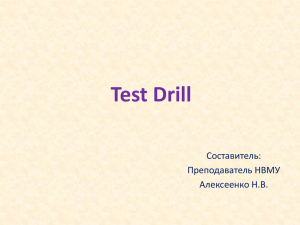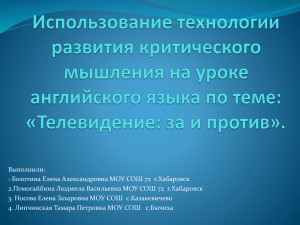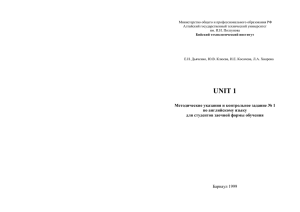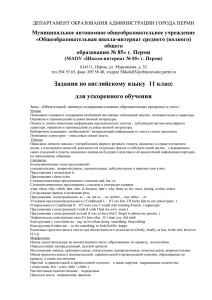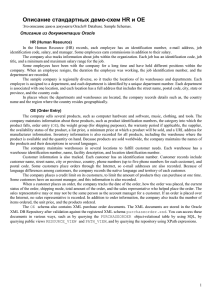Грамматические таблицы
реклама
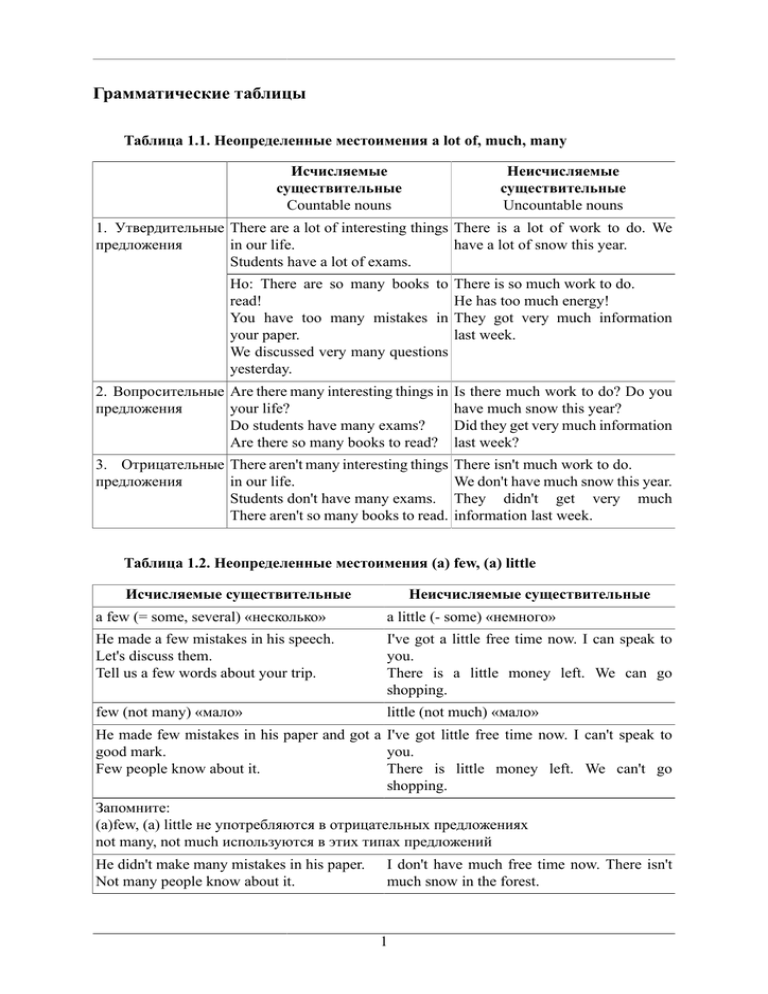
Грамматические таблицы Таблица 1.1. Неопределенные местоимения a lot of, much, many Исчисляемые существительные Countable nouns Неисчисляемые существительные Uncountable nouns 1. Утвердительные There are a lot of interesting things There is a lot of work to do. We предложения in our life. have a lot of snow this year. Students have a lot of exams. Ho: There are so many books to read! You have too many mistakes in your paper. We discussed very many questions yesterday. There is so much work to do. He has too much energy! They got very much information last week. 2. Вопросительные Are there many interesting things in предложения your life? Do students have many exams? Are there so many books to read? Is there much work to do? Do you have much snow this year? Did they get very much information last week? 3. Отрицательные There aren't many interesting things предложения in our life. Students don't have many exams. There aren't so many books to read. There isn't much work to do. We don't have much snow this year. They didn't get very much information last week. Таблица 1.2. Неопределенные местоимения (a) few, (a) little Исчисляемые существительные Неисчисляемые существительные a few (= some, several) «несколько» a little (- some) «немного» Не made a few mistakes in his speech. Let's discuss them. Tell us a few words about your trip. I've got a little free time now. I can speak to you. There is a little money left. We can go shopping. few (not many) «мало» little (not much) «мало» He made few mistakes in his paper and got a I've got little free time now. I can't speak to good mark. you. Few people know about it. There is little money left. We can't go shopping. Запомните: (a)few, (a) little не употребляются в отрицательных предложениях not many, not much используются в этих типах предложений Не didn't make many mistakes in his paper. Not many people know about it. I don't have much free time now. There isn't much snow in the forest. 1 Таблица 1.3. Таблица неправильных глаголов Infinitive Past Indefinite Past Participle Participle I 1 arise возникать arose arisen arising 2 awake будить, просыпаться awoke awaked awoke awaked awaking 3 be быть was, were been being 4 bear рождать bore born bearing 5 bear носить, выносить bore borne bearing 6 beat бить beat beaten beating 7 become становиться became become becoming 8 befall случиться befell befallen befalling 9 begin начинаться began begun beginning 10 bend гнуть, сгибать bent bent bending 11 bet держать пари bet bet betting 12 bind связывать bound bound binding 13 bite кусать bit bitten biting 14 blow дуть; программировать ППЗУ blew blown blowing 15 break ломать broke broken breaking 16 bring приносить brought brought bringing 17 broadcast передавать по радио; передавать broadcast broadcast broadcasting сообщение (всем узлам сети, терминалам, broadcasted broadcasted задачам, ждущим события) 18 build строить built built building 19 burn гореть, жечь; программировать ППЗУ burnt burnt burning 20 burst разрываться burst burst bursting 21 buy покупать bought bought buying 22 cast бросать, кидать cast cast casting 23 catch ловить, схватывать caught caught catching 24 choose выбирать chose chosen choosing 25 cling прилипать, цепляться clung clung clinging 26 come приходить came come coming 27 cost стоить cost cost costing 28 creep ползать crept crept creeping 29 cut резать; удалять, вырезать cut cut cutting 30 dare сметь durst dared dared daring 31 deal торговать, иметь дело dealt dealt dealing 2 32 dig копать dug dug digging 33 do делать did done doing 34 draw тащить, рисовать drew drawn drawing 35 dream видеть сны, мечтать dreamt dreamed dreamt dreamed dreaming 36 drink пить drank drunk drinking 37 drive гнать, везти, ехать drove driven driving 38 dwell обитать; останавливаться подробно dwelt dwelt dwelling 39 еat есть ate eaten eating 40 fall падать fell fallen falling 41 feed кормить, -ся; подавать fed fed feeding 42 feel чувствовать felt felt feeling 43 fight бороться, сражаться fought fought fighting 44 find находить found found finding 45 flee бежать, спасаться бегством fled fled fleeding 46 fling кидать, бросать flung flung flinging 47 fly летать flew flown flying 48 forbid запрещать forbade forbidden forbidding 49 forget забывать forgot forgotten forgetting 50 forgive прощать forgave forgiven forgiving 51 freeze замерзать, замораживать froze frozen freezing 52 get получать, становиться got got getting 53 give давать gave given giving 54 go идти, ехать went gone going 55 grind точить, молоть ground ground grinding 56 grow расти, выращивать grew grown growing 57 hang висеть, вешать hung (hang в значении «казнить» является прав. гл.) hung hanging 58 have иметь had had having 59 hear слышать heard heard hearing 60 hide прятать hid hid hidden hiding 61 hit ударять, поражать hit hit hitting 62 hold держать; хранить held held holding 63 hurt повредить, ушибить hurt hurt hurting 64 keep держать, хранить kept kept keeping 3 65 kneel становиться на колени knelt knelt kneeling 66 know знать knew known knowing 67 knit вязать knit knit knitted knitting 68 lay класть laid laid laying 69 lead вести led led leading 70 lean прислоняться leant leaned leant leaned leaning 71 leap прыгать leapt leaped leapt leaped leaping 72 learn учиться learnt learned learnt learned learning 73 leave оставлять, уезжать left left leaving 74 lend давать взаймы, одалживать lent lent lending 75 let позволять, сдавать в наем let let letting 76 lie лежать lay lain lying 77 light зажигать, освещать lit lighted lit lighted lighting 78 lose терять lost lost losing 79 make делать, заставлять made made making 80 mean значить, подразумевать meant meant meaning 81 meet встречать met met meeting 82 mistake ошибаться mistook mistaken mistaking 83 pay платить paid paid paying 84 put класть put put putting 85 read читать read read reading 86 ride ездить верхом rode ridden riding 87 ring звонить, звенеть rang rung ringing 88 rise подниматься rose risen rising 89 run бежать ran run running 90 saw пилить sawed sawn sawing 91 say говорить, сказать said said saying 92 see видеть saw seen seeing 93 seek искать sought sought seeking 94 sell продавать sold sold selling 95 send посылать sent sent sending 96 set помещать, ставить; заходить (о солнце); set устанавливать set setting 4 97 shake трясти shook shaken shaking 98 shave брить, -ся shaved shaven shaving 99 shed проливать (слезы, кровь) shed shed shedding 100 shine сиять, светить shone shone shining 101 shoot стрелять shot shot shooting 102 show показывать showed shown showing 103 shrink сморщиваться; сокращаться shrank shrunk shrinking 104 shut закрывать shut shut shutting 105 sing петь sang sung singing 106 sink погружаться, тонуть sank sunk sinking 107 sit сидеть sat sat sitting 108 sleep спать slept slept sleeping 109 slide скользить slid slid sliding 110 smell пахнуть; нюхать smelt smelted smelt smelted smelling 111 sow сеять sowed sown sowing 112 speak говорить spoke spoken speaking 113 speed спешить; ускорять sped sped speeding 114 spell писать или произносить слово по spelt буквам spelled spelt spelled spelling 115 spend тратить spent spent spending 116 spill проливать spilt spilled spilt spilled spilling 117 spin прясть span spun spinning 118 spit плевать spat spat spitting 119 split раскалывать, -ся split split splitting 120 spoil портить spoilt spoiled spoilt spoiled spoiling 121 spread распространять, -ся spread spread spreading 122 spring прыгать sprang sprung springing 123 stand стоять stood stood standing 124 steal красть stole stolen stealing 125 stick приклеивать, -ся stuck stuck sticking 126 sting жалить stung stung stinging 127 strike ударять, бастовать struck struck striking 128 strive стремиться; стараться strove striven striving 129 swear клясться, браниться swore sworn swearing 5 130 sweep мести swept swept sweeping 131 swell пухнуть, раздуваться swelled swollen swelling 132 swim плавать swam swum swimming 133 take брать took taken taking 134 teach обучать, учить taught taught teaching 135 tear рвать tore torn tearing 136 tell рассказывать told told telling 137 think думать thought thought thinking 138 throw бросать threw thrown throwing 139 tread ступать trod trodden treading 140 understand понимать understood understood understanding 141 undertake предпринимать undertook undertaken undertaking 142 wake будить; просыпаться woke waked woken waked waking 143 wear носить wore worn wearing 144 weep плакать wept wept weeping 145 win выигрывать won won winning 146 wind заводить (часы); виться wound wound winding 147 wring скрутить, сжать wrung wrung wringing 148 write писать wrote written writing Таблица 1.4. Согласование времен Характер действия Прямая речь Косвенная речь 1. Одновременность a) действие главного предложения происходит одновременно с действием придаточного b) действия, выраженные с помощью модальных глаголов Не said, "I work hard." Не said, "I am working hard." He said, "I can work hard." He said, "I may work hard." He said, "I have to work hard." He said, "I must work hard." He said, "I should work hard." He said, "I ought to work hard." He said (that) he worked hard. He said (that) he was working hard. He said (that) he could work hard. He said (that) he might work hard. He said (that) he had to work hard. He said (that) he must work hard. He said (that) he should work hard. He said (that) he ought to work hard. 2. Предшествование (два He said, "I have worked hard." He said (that) he had worked действия в прошлом, одно из He said, 'I worked hard." hard. 6 которых произошло раньше другого) He said (that) he had worked hard. 3. Будущее действие (Future He said, "I am going to work in the Past) hard." (два действия, одно из He said, "I will work hard." которых в прошлом, а второе направлено на будущее) He said (that) he was going to work hard. He said (that) he would work hard. Таблица 1.5. Условные предложения Тип Придаточное предложение Главное предложение 1. Реальное условие If I have money, I'll buy a computer. 2. Нереальное If I had money, условие, относящееся к настоящему или будущему времени I would computer. buy Перевод Если у меня будут деньги, я куплю компьютер. a Если бы у меня были деньги, я бы купил компьютер. 3. Нереальное If I had had money last I would have bought a условие, year, computer. относящееся к прошлому 4. Смешанный тип If you worked hard, предложений (вообще) If you had worked hard last term, (в прошлом) Если бы у меня были деньги в прошлом году, я бы купил компьютер. you wouldn't have made so many mistakes in the last test, (в прошлом) you would know the answer now. (сейчас, в настоящий момент) Таблица 1.6. Таблица всех времен в Passive Voice Present Past Future Futurein-the past Simple (Indefinite) Letters are writen The letter was The letter will be (He said that) the every day. written yesterday. written tomorrow. letter would be written the next day. Continuous (Progressive) The letter is being The letter was Simple or Active Simple or Active written now. being written at 5 voice voice o'clock yesterday. Perfect The letter has The letter had The letter (He said that) the already been been written by 5 will have been letter would have written. o'clock yesterday. written been written 7 by 5 o'clock by 5 o'clock the tomorrow. next day Perfect Continuous Perfect or Active Perfect or Active Perfect or Active Perfect or Active Voice Voice Voice Voice Таблица 1.7. Инфинитив без частицы to 1. После вспомогательных глаголов do, — Do you speak French? — I don't know it. does, shall, will, should, would — Shall I help them? — They will do it themselves. — What should I do? — We would call you if we could. 2. После модальных глаголов (кроме ought My sister can play football. to, be to, have to) и модальных фраз What must I do? You'd better leave now. We cannot but refuse him. 3. После глаголов чувственного восприятия to hear, to see, to feel, to notice, to watch Но: Если эти глаголы употребляются в пассивном залоге, то инфинитив будет с частицей to. Somebody heard him say that. Nobody saw them leave. We noticed her turn pale. She watched the plane land. Не was heard to say that. They were seen to leave. She was made to do it. 4. После глаголов принуждения let, make Запомните: Глагол let не употребляется в пассивном залоге; употребляйте глагол to allow Let us discuss the problem. We let them go home. I'll make you understand it. You can't make me do such a thing. We let them decide the question. Ho: They were allowed to decide the question. 5. В вопросах, начинающихся с Why? Why do it? Why risk it? (Почему бы не..?) Why not go to a pub? Why not tell us the whole story? 8
